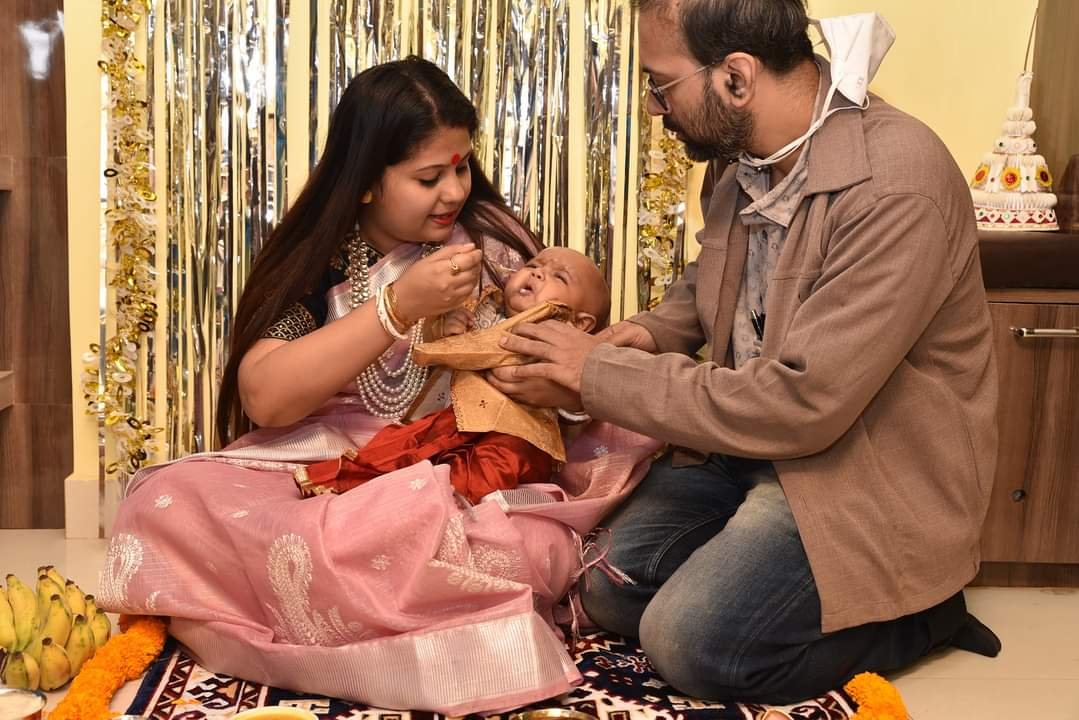The family was gearing up for the ensuing rice ceremony of the little one. Piu, the new mom was ecstatic. It was the first big event of her son’s life and she wanted it to be perfect. She had toiled hard for days keeping at bay her postpartum problems. From decoration to dresses to food arrangement – she had made sure of everything. A day before the ceremony as she was gleefully arranging the dresses for the function the mother-in-law coyly suggested –
“Piu, it is a rule that the mother should not watch the child having his first rice. Just make sure during that function you should not be in the same room.”
And then she hastily added, “We will call you as soon as the function is over.”
Looking at Piu’s crestfallen face, her father-in-law tried to be gentle, “You can always watch it later in the video.”
Yes, the video by the photographers which Piu had finalized after painstakingly searching and reading reviews.
Mothers are a bad omen, leave them out!
It is a common practice in the Bengali community that a mother must be kept away from the most important rituals of a child’s life, be it the rice ceremony or the wedding. The presence of the mother is considered to be a “bad omen” during such important functions.
Strange isn’t it? The one who showers unconditional love for us, and has undergone excruciating pain just to bring that being on this earth is considered inauspicious during the important rituals.

There is no logic behind the exclusion
Now, if Piu is a rebel like me, she can question what problem will befall if the mother enjoys the ritual with her child and since there can never be a valid explanation for such discrimination she will make sure to defy the norms with her graceful presence.
I call this systematic cleansing!
Then, there would be the practice that only the brother of the mother can do this ritual (with the mother out of sight 🙄). In absence of a brother, it can be the grandfather or a distant cousin even. Predominantly it must be a man. The women are systematically cleansed of such duties. Cooking, decoration, and all the hard work come under the duty of the women though.
Women do all the hard work and are shunned away, while men get to enjoy the fruits of the hard labour! Isn’t that discrimination?
I do not have a brother but I have a rock-solid sister who is one of the pillars of our existence. And I made sure she offers the first sweet dish to my son. It is high time the world knows we may not have a brother but sisters aren’t any less.
When women question and do away with age-old rituals, they are called ‘too modern’!
Years ago at a friend’s wedding, the mother of the groom had accompanied the bridegroom party. There were whispers, and hushed muffles and my younger self with her tinted view was unable to understand the reason. Later, as I was showing the snaps to my mother she gasped. ‘Too modern’ was her verdict. When I asked the reason for such staunch barring, the answers came in some cyclical manner – the ancestors must have known better, the age-old concept of “Nazar” and so on. For the interest of the readers, the friend is happily married to her partner for more than a decade now and is a proud parent of a dashing young boy. Also, with all my reasoning and logic we could not make my mother watch the rituals of the wedding for both of us sisters. Sigh!
Social practices, rituals, and festive events reaffirm the identity of those who practice them as a group or a society. That is a thing with ritual. It becomes the norm without understanding the real logic behind the diktat. And as a spillover, the patriarchal society bans and schemes to keep the women away during important events while offering consolation prizes. The women, already claustrophobic under the do’s and don’ts, often lose the enthusiasm to fight for the cause, settling for much lesser.

Bringing home a slave and not a partner when the boy gets married!
In Bengali weddings, there is another regressive practice where the groom while leaving the home to reach the wedding venue (leaving the mom behind) will come to ask for formal permission and will say, “Ma tomar jonyo daashi ante jachi.”(Ma, I am going to bring you a domestic slave!)
No wonder the mother-in-law and the daughter-in-law are so strained. A relationship that starts on a note of disrespect can certainly go awry. Thankfully, many households have stopped using this very phrase but the sentiment remains. The mother will get jealous to share her son with another woman, is one of the causes cited often for such degenerative practices. But that is in my opinion another age-old ploy to pit women against women. In that logic why shouldn’t the father of the bride have the same sentiment?

Inclusivity is the key!
Well, the discussions can go on forever. Is it too much if we demand more inclusive rituals? We can only take baby steps to improve the condition.
I am curious to know your take on it. Have you ever faced such biases and did you take a step?
BY SREEPARNA SEN
\

















2 Responses
I really liked this blog. Sadly,these practices are common but hardly ever questioned. My mother did not see me getting wed. Thankfully there was no bar to my being there during my children’s rice ceremony. But a couple of years back I did come across an occasion where the groom did tell his mother that he was going to bring her a ‘dasi’!
Thankfully things are changing very fast. Girls and boys nowadays are doing away with many of these demeaning rituals.Weddings in my family has happened where no kanyadan was performed,instead the father prayed for the well-being of the new couple,no rice was thrown by the bride into her ma’s Anchal saying she has repaid all the debt! What mean,mindless customs I often wonder!
It’s a beautiful piece Sreeparna. Absolutely loved reading it.❤️